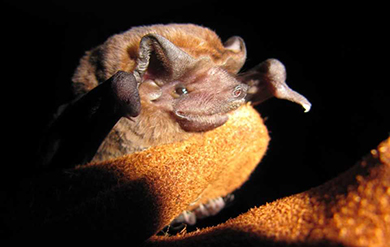
With the start of the 2018 hurricane season on June 1, Virgin Islands homeowners still heavily focused on repairing structures damaged by Hurricanes Irma and Maria are urged to contact Dr. Renata Platenberg if bats have taken up residence in your home. Platenberg, assistant professor of Natural Resource Management at the University of the Virgin Islands, has a permit from the Department of Planning and Natural Resources (DPNR) to handle and care for bats.
The twin hurricanes displaced not only humans but colonies of Pallas’ Mastiff Bats (Molossus molossus) that occupy roof spaces in the Virgin Islands. This species is the Territory’s only insectivorous bat and are no threat to humans. Each bat eats enormous amounts of insects, including mosquitos that carry Dengue and Zika; and plays an important role in pest control. “These bats do not carry rabies or transmit any zoonotic pathogen that is harmful to humans,” Dr. Platenberg said.
Trying to remove bats without professional help at this time could adversely affect the population. Breeding season for this species occurs from May to September, with pregnant females giving birth at the end of June and early July. The pups are not able to fly until they are six-eight weeks of age, and until they can fly, they remain in the roost site with the mother, who forages at night for insects.
“While I do not wish to impede critical home restorations, there is a significant concern that these activities will cause substantial mortality to bats, and I want to make sure that people are able to get the information that they need in order to minimize disturbance and mortality to bats at this critical time in their breeding season,” said Dr. Platenberg.
All Territory bat species were severely impacted by Hurricanes Irma and Maria, and it is important that all reasonable measures be taken to ensure that the breeding season is not disrupted. Additionally, VI bats and their breeding roost sites are protected by VIC Title 12 Chapter 2 section 105. All species of bats are identified in the VI Wildlife Action Plan as being species of greatest conservation need.
The nests of all seabirds come within the protection Virgin Islands Code 105. The subsection prohibits persons from harassing or killing indigenous species.
Individuals who are aware of pregnant females or females with pups that are in immediate need of relocation can contact Dr. Platenberg who is specifically trained to do the removals.
Please share this information with all relevant personnel. For more information and or to seek assistance, contact Dr. Renata Platenberg at (340) 344-9090 or renata.platenberg@uvi.edu.

